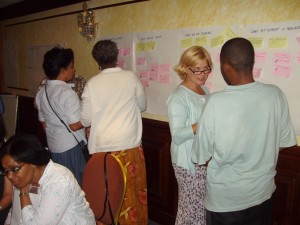According to Teresa Fenn, a Technical Director with Risk & Policy Analysts Limited (RPA) – a Norfolk-based consultancy providing advice to clients spanning the chemicals, energy, water, waste and more general environmental sectors around the world – applying the Facilitation methodology outlined in APMG-International’s Facilitation skills certification scheme amounts to a paradigm shift in thinking. However, it’s a change that is having a highly beneficial effect on RPA – and the work that the consultancy is doing.
Teresa explained: “Having been introduced to his approach to Facilitation – via Tony Mann, of Resource Strategic Change who is also senior examiner on APMG-International’s Facilitation skills certification scheme – we organised a workshop for a project involving 30 or so stakeholders, who include local business owners, local Council officials and representatives of the local residents, through parish council representatives. That workshop descended towards chaos and ended in disagreement. Although we weren’t revealing anything in the workshop, that the participants didn’t already know, they surprised us by exhibiting some entrenched attitudes.
“At this point, we realised the value of our training in Facilitation skills.
“Rather than sticking to our original plan – which we would have done before we’d encountered the Process Iceberg® Facilitation skills methodology – we took a more flexible approach. So we worked with the stakeholders – using the various Facilitation skills, tools and approaches that we’d learned – to help the stakeholders move from resistance to developing and agreeing plans of action for the immediate, short and longer terms. In this way, we brought the stakeholders’ various views, opinions and positions together, so that they could agree a way forward and plan how this could be financed realistically.”
With a number of its projects, Teresa believes that RPA has seen how a systematic, process-orientated approach to Facilitation can produce positive, powerful and amazingly swift results. She said: “We’re delighted that we’re benefiting from this approach – and we’d have no hesitation in encouraging others to use the same approach in developing Facilitation skills and expertise.”
The certification scheme in Facilitation skills from APMG-International – the provider of specialist qualifications for knowledge-based workers, including PRINCE2® and ITIL® – aims to teach candidates how to design, apply and use specific processes and tools in order to increase the success of programmes and projects. Based on Tony Mann’s Facilitation methodology, APMG’s scheme offers facilitators the opportunity to be trained, assessed and certified in a similar way to project managers with Foundation and Practitioner qualifications.
“Effective facilitation can make the difference between a solution that has all kinds of hidden problems and one that is robust and can be made to work,” said Tony Mann. “It helps people work collaboratively on key issues and also to make fundamental decisions.”
“Facilitation is a professional skill which can be used in the workplace to identify and resolve issues, encourage productive interaction, develop accurate objectives and define the scope of change projects,” he added. “Good facilitators empower and encourage teams so they get the most out of strategic planning exercises.”







Leave A Comment
You must be logged in to post a comment.